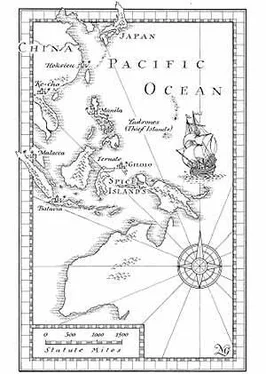Ma’pang chuckled at the Frenchman’s reaction. ‘We think that the guirragos look stupid and ridiculous dressed in their clothes.’
‘But what about her hair?’ asked Hector, trying not to stare. The woman’s hair was near-blonde.
‘Even if they don’t wear clothes, our women still want to be attractive,’ Ma’pang replied. ‘Those who wish to, colour their hair with lime.’
Followed by a swarm of gawking, giggling children, they arrived before a massive, barn-like building. It was raised ten feet off the ground on mushroom-shaped stone pillars.
‘This is the uritao, the house for the unmarried men. You will stay here until the council decides what is to be done with you,’ said Ma’pang.
They climbed a bamboo ladder and found themselves in a long, cool, high-ceilinged shed smelling pleasantly of palm thatch. Neatly fashioned windows gave light and air. The floor was of massive timber planks lashed in place with coir, the surface worn smooth by feet. The place was spotlessly clean. Mattresses of palm matting stuffed with dried coconut fibre had been laid against one wall. ‘The council likes to discuss matters at length before it reaches a decision,’ explained Ma’pang. ‘So you should make yourselves comfortable.’
Jacques sank down on one of the mattresses with a sigh. ‘Hector, this is better than being on a ship,’ he announced. ‘All I need now is for one of the village girls to bring me a glass of wine.’

OVER THE NEXT WEEK they found it increasingly difficult to remember they were prisoners. Hector presumed that Ma’pang had persuaded his clan that their captives were enemies of the Spanish, for the five men were permitted to wander freely about the village by day. Naturally the children followed them everywhere, pulling faces and pretending to be scared, but their parents got on with the routine of their daily lives. In the cool of the morning the women walked to the nearby plantations and gardens. There they tended small plots of taro and yam, weeded sugar cane, cleared the ground around their banana trees and gathered breadfruit, until it was time to come back and prepare the afternoon meal. The men and older boys set out in the opposite direction. They took the footpath leading down the valley to the beach. Dan asked if he might go with them and discovered that it was less than ten minutes to the spot where they kept their fishing canoes.
‘There are some things that even the Miskito could learn from them,’ he said when he returned at dusk, carrying a string of flying fish for supper. ‘They make miniature canoes for the young ones. Some of the boys are only six or seven years old. Yet they go out fishing on their own. They keep inshore, of course, under the eye of the older men. But the boys bring back a share of the catch.’
‘Did you show them how to strike fish?’ asked Jezreel.
‘They do not have the right equipment for it,’ answered the Miskito. ‘Their tridents are tipped with bone or sharp wood. I think iron is too precious to risk losing at sea. Besides, they do very well with these . . .’ He held up a beautifully crafted fish hook made from carved shell. ‘One of the older men gave me this. I think he thought I brought him luck. He came back with a tuna that must weigh at least twenty pounds.’
He was interrupted by the arrival of Ma’pang. The big islander came each evening to the uritao to report on the long-drawn-out deliberations of the village council. His broad, dark face was solemn as he squatted down beside the five foreigners.
‘The council talk and talk, but reach no conclusion,’ he said.
‘What would you have them do?’ asked Hector.
‘Have the courage to make the Spaniards leave us alone, so that we can continue with our own ways and customs.’ Ma’pang was chewing betel. He shifted the wad from one cheek to the other.
‘Is that why you took us alive, when you could have killed us?’
Ma’pang gave the young man a sharp glance. ‘You know what I had in mind?’
‘You wanted us as hostages.’
Ma’pang nodded. ‘The Spanish keep some of our chief men locked up in their fort as a guarantee for our good behaviour. I hoped to have the prisoners released in exchange for your return.’
‘And what does the council say, now they know we’re valueless?’ Hector could see fierce determination in Ma’pang’s eyes.
‘I’ve suggested that we gather other clans, storm the fort and free the prisoners while the Governor is away.’
For one brief moment Hector imagined a horde of naked, yelling warriors swarming into the Presidio and ransacking it, while he searched for Maria in the confusion, and then the two of them escaping together. ‘What did the council say?’
Ma’pang’s reply crushed his hopes. ‘They reminded me that five years ago four hundred warriors, more than we could hope to assemble nowadays, tried to take the fort. They were driven off, with heavy loss, by the same Spanish commander who is in charge now. A brave man.’
Dan had been following the conversation, and now he asked quietly, ‘Could we not get into the fort secretly and release the prisoners? Jacques says the garrison guards are very slack.’
The Chamorro smiled wryly, his blood-red gums showing. ‘Even if we succeeded in climbing the walls, we would never manage to enter the cells. They are locked, and the prisoners are shackled. We have no experience of dealing with such things.’
It was true, Hector thought to himself. There were no doors to the houses in the Chamorro village and therefore no locks or fastenings. Nothing was ever hidden or guarded; everything was left lying about in the open and was treated as common property. If someone needed an item, he or she simply picked it up and used it.
‘Ma’pang,’ he said earnestly. ‘If you can arrange to get myself and Jacques and Dan into the fort, we can deal with the locks and chains. Jacques knows all about padlocks and how to open them. But in return you must help me contact the young woman I told you about.’
‘The one you would marry?’
‘She lives in the Governor’s quarters. I need to find her and talk to her, and if she agrees, I want her to come away with me.’
Ma’pang’s heavy eyebrows shot up in surprise. ‘You think she would agree?’
‘I’ll not know until I ask. Do you think the council will consent to such a plan?’
‘They don’t have to,’ Ma’pang answered without a moment’s hesitation. ‘There are six or seven men who would help me. The same ones who captured you on the beach that day.’
‘And how will we get to Aganah?’
Ma’pang rose to his feet. ‘Two galaide layak can sail across the straits under cover of darkness, and land us a few miles to the north of the town, without being seen. From there we march overland.’
TWELVE

INCH BY INCH Dan raised his head. He was crouched in the sawgrass on the hillside above Aganah. Below him lay the untidy sprawl of the native town and, beyond that, the rectangular block of the Spanish Presidio. He faced down into the valley, held his breath and opened his mouth. He kept totally still, for that was how his father had taught him to listen when scouting. It had been part of his training for slaving raids on the inland villages where the Miskito kidnapped their servants and concubines. Dan could still remember the excitement of his first raid: the cautious river journey by canoe, a landing well short of the target village, the silent march through the jungle, the lone scout sent ahead to examine the best line of attack.
Now he assessed Aganah in the same way. He’d been at his vantage point since first light, watching the houses, counting the number of people moving about, noting where they were going and how soon they returned, gauging the best route to reach the walls of the Presidio without raising the alarm. Tonight there was no moon, and if the sentries were as incompetent as Jacques had reported, it was unlikely they’d spot the raiders approaching the wall. The real risk of discovery would come sooner, while crossing the town itself. If the local residents were disturbed, the raid would be a disaster. That was why he listened so carefully, ignoring the background whisper of the breeze through the tall grass around him and the buzz and scratchy chirps of insects in the warm early afternoon. He picked up snatches of voices from below, indistinct and very faint, the thumping sound of someone chopping or pounding, the cry of a baby. For a moment he was startled by a long, hollow moan. Then he recalled hearing that the Spaniards had brought water buffalo from the Philippines as draught animals and for milk. But it wasn’t the water buffalo that concerned Dan, or the handful of imported horses, which had so terrified the Chamorro, who thought of them as outlandish monsters. Dan was listening for dogs.
Читать дальше










